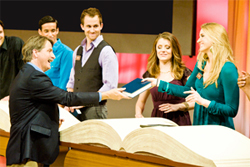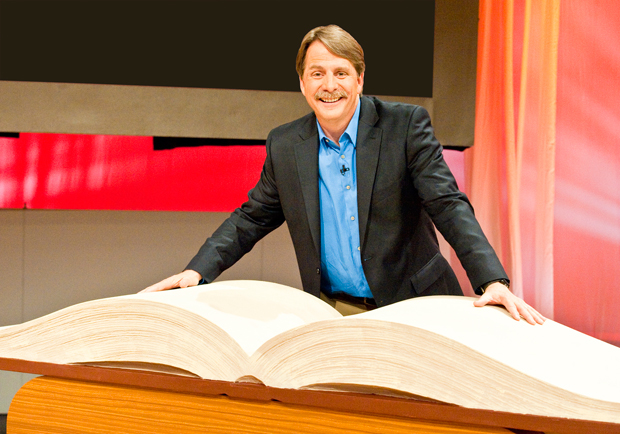Comedy fans know Jeff Foxworthy for his particular brand of Southern-fried humor, with many of his best one-liners beginning, "You might be a redneck if …" In more recent years, he's become better known as the host of Are You Smarter Than a Fifth Grader?, which enjoyed a popular four-year run on Fox TV before being cancelled last year.
 Photo courtesy of GSN
Photo courtesy of GSNNow Foxworthy is gearing up for his next TV gig as host of The American Bible Challenge, a one-hour show premiering Thursday night (8/7c) on the Game Show Network (GSN). (A preview.) Foxworthy, 53, looks forward to hosting the show that will test contestants' knowledge of Scripture; teams will be playing to win money for charities.
Foxworthy spoke to CT about his new job, his faith, his sense of humor, and his desire to make the Bible more accessible to millions of viewers.
How did you end up with this gig?
Fifth Grader didn't get renewed last year, which I really enjoyed doing. I never thought I would do a game show, but now I guess I'm now officially in that genre. So the people behind Bible Challenge asked me if I'd be interested. I had to think about it, because it's a tricky area: Part of me was like, Do you do a game show about the Bible? But I thought, Okay, God, you know I'm an idiot, so you've got to make this clear if you want me to do this or not.
What ultimately convinced you to say yes?
That the people that are playing on the show are not playing for themselves. They're playing for money to bless somebody else, whether it's building wells in Africa or inner-city kids or something, some charity or ministry of their choice.
How would you do as a contestant on this show? Are the questions pretty hard?
I'm probably like a lot of people. If we kept it in the New Testament I think I would do pretty good. But when you start getting back to the facts in Leviticus, I might not. That's the challenge for us, to make it not just about facts. That's been my struggle: How do you do this where you're not only able to do a game show, but how do you share the good news within it, too? How do we make it go from head knowledge to heart knowledge? How do you turn this into something intriguing for somebody that's not interested in the topic, versus a host who wasn't a believer and didn't really care? As I've wrestled with this, I've decided to try to let that be kind of my mission.
It's kind of cool that it's not just running on a Christian network, but on a mainstream network like GSN, where all types of folks can tune in.
That's my hope. If it was just going to air on a Christian network, I probably wouldn't be interested. But that's where I land. I don't really like to speak in churches; I just always feel like that's preaching to the choir. I teach a Bible study for homeless guys in downtown Atlanta every week. Been doing it for years. That's the guys I'd rather go talk to. I'd rather take my act outside the church.
But the challenge is, how do you make this appealing? How do you show that this is more than just a book of facts and rules? That was always part of my conversation with the people at GSN, that if we can somehow mix in the good news with this, then, yeah, I'm up to the challenge.
Can you give an example of what that looks like?
Yes. One of the little games they came up was a thing about, was is it a law in the Bible or is it an obscure law in some U.S. state? One of them was, "Thou shalt not have a Mohawk," which is covered in Leviticus [19:27]. I said, "Okay, if we do something like that, you've got to allow me to put that in context, because what that was written to the Israelites right after they had left Egypt, and God was saying, 'Look, you don't have to look like an Egyptian anymore; I've separated you.'" The last thing I want is some 20-year-old kid with a Mohawk at home watching this going, "Oh, God doesn't love me." So some of this stuff you're going to have to be able to put it in context, and that's a little bit of a challenge.
 Photo courtesy of GSN
Photo courtesy of GSNSounds like you're not just winging it upon seeing the questions for the first time on the air, but you actually get a chance to study up a little.
Yeah, I want to see this stuff in advance, so that when we come to things like this, I will be able to explain what that is all about. And Lord knows I'm not an expert.
You've never hidden your Christian faith, but will this show sort of be a coming out for you? Will people go, "Wow, I had no idea Foxworthy was a Christian"?
I guess it's kind of hard to hide on a show called The American Bible Challenge! I did say to my wife recently, "How did I become a spokesman for Christianity here?" I'm going, "Really, God? I'm the best you can march out there for this?" But it's okay. The sad thing about being the face of Christianity for anything is you can only fail … especially when you're a comedian! Somebody's going to hear some joke and go, "Well, I don't approve of that."
Ha! Well, some would say we Christians are pretty humor impaired.
A lot of times we probably are. People have asked me, "Why don't you just be a Christian comedian?" And I'm like, "Why don't I just be a comedian that's a Christian?" I'm not saying there's anything wrong in being … I mean, there's some really funny ones out there. But me, I'm a big outdoorsman. I love to hunt and fish. I'm down on my farm right now. So I speak at things like wild game dinners, and the people that come to hear me come because I'm a comedian. I'm talking to a bunch of people that wouldn't go to a church; they've either been burned by it or turned off to it. But we have something in common in that we like to laugh and we like the outdoors. Then you kind of have an audience where you can say, all right, we've been laughing, but also consider this …
We're living in a day with a lot of harsh rhetoric, culture wars, and us versus them. A lot of people are shouting at each other, including Christians. It seems that comedy and laughter are desperately needed. What's your take on that?
I totally agree with you. We go to North Point, Andy Stanley's church [in the Atlanta suburbs]. Andy just finished a whole series on that point. It's like, you can call yourself a Christian and you can be a Democrat; you can be a Republican. You can be a white supremacist. Any group can make the skin still fit within that. But Andy finished by talking about Jesus at the Last Supper where he's like, "Okay, we've talked about a lot of stuff in the last three years, but if you don't do anything else, love one another as I have loved you." Andy did an eight-part series on that, and I just loved it.
You know what? We're all screwed up. And the way Christians mess things up is we act like we've got it going on. And if we would just stay in that place of, hey, we're all screwed up and but for the grace of God none of us have a shot here. We need to have a sense of humor about it; that's kind of the way I've always faced my comedy.
Is the church good fodder for humor? Are we any good at laughing at ourselves?
No, we're not very good at it, but we certainly should be able to laugh at ourselves because we can be idiots sometimes. I think that's the appeal for me. People ask me, "Are you religious?" But I don't like the word religious, because the only people Jesus argued with were "religious" people. I think that's why I love doing this stuff with the homeless guys so much, through Atlanta Mission. [Foxworthy discusses his work in this brief video.] They take guys off the street and put them up for a year, help them go through detox and get clean. Those guys get it. They get it better than people in church because they're not clinging to their own self-righteousness. When you're living under a bridge, you kind of understand it's nothing based on you. That's why I love working with those guys. They understand.
What about humor at the expense of your family?
My poor wife! I remember one time we were in the airport and somebody walked up to her and said, "Oh, are you the one with the cold butt?" And my wife was like, "Please quit talking about my rear end on television." Because I had a routine where I'd say, "I don't understand when a woman gets in the bed, the temperature of their feet and butt drop to below freezing." And my wife's like, "Please quit talking about …" And my poor daughters. It was so much easier when they were little. But now they understand that I'm talking about them, and so it's like, "Okay, Dad, no more."
So do you have to run it by them before you'll use it in your act?
Well, it depends on how funny it is, you know? Sometimes it's better to just ask for forgiveness later than ask for permission. "Oh no, honey, I didn't mean that like that!"
You and Bill Engvall and others are continuing a line of what I call Southern comedy, reminiscent of Jerry Clower and Lewis Grizzard. How would you describe that brand of humor, and what's special about it?
That's a great question, and I don't know the answer. Maybe it's because we don't take ourselves too seriously. We have the ability to laugh at ourselves. My granddaddy listened to Jerry Clower records, and I remember sitting in his house and you'd just laughing while listening to him.
It's like with the redneck stuff that I do. For me, I wasn't laughing at somebody. I was laughing with 'em. I mean, it wasn't research going on to come up with this stuff. It was my family, and those are the ones that got the biggest laughs. You know, when I first started out, being from the South and going to New York or Chicago, people kept telling me to get voice lessons and "lose that stupid accent you got." And I'm like, "Well, where I come from, you have the stupid accent." And so I was pretty stubborn about holding onto it, and I'm glad I did.
Who were your role models in comedy?
People like Bill Cosby. I remember being a kid and saving my allowance to buy Cosby records. And I would memorize them, and I'd go to school and do them and then get in trouble for them. But the first time I played the Fox Theater in Atlanta, somebody brought a note to the dressing room, and it was from my high school principal. The note said, "I cannot believe I am shelling out money to listen to the same kind of stuff I used to try to put a stop to." I was in his office many times with him just staring at me going, "What do you think you are, a comedian?" Well, apparently so, Mr. Gibbons!
But the thing about Cosby was that he just talked about everyday life, and he was able to do it in a way where he wasn't filthy in doing it. I always thought that was part of the art of comedy, was to be able to say stuff without saying stuff. I mean, you can talk about anything; just give the audience credit for a little imagination.
Photos courtesy of GSN
© 2012 Christianity Today. All rights reserved. Click for reprint information.











